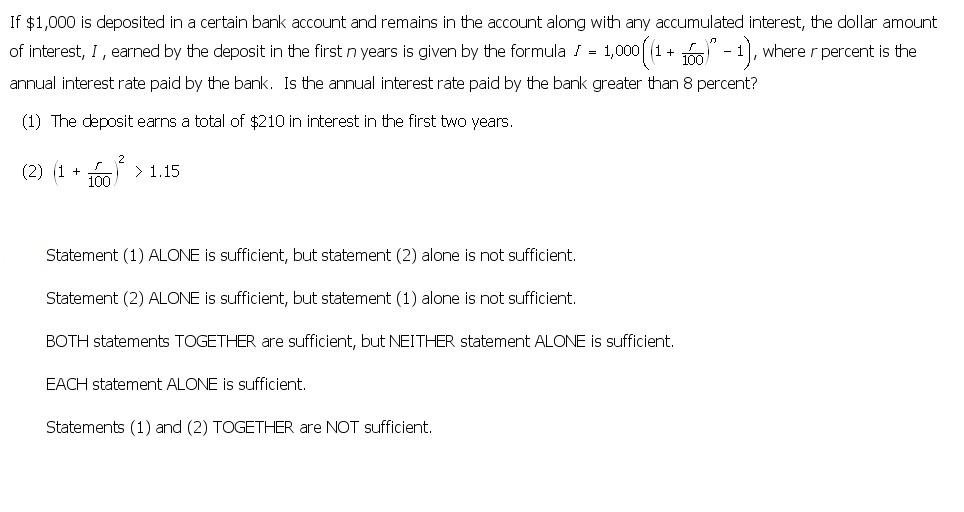Events & Promotions
|
|

GMAT Club Daily Prep
Thank you for using the timer - this advanced tool can estimate your performance and suggest more practice questions. We have subscribed you to Daily Prep Questions via email.
Customized
for You
Track
Your Progress
Practice
Pays
Not interested in getting valuable practice questions and articles delivered to your email? No problem, unsubscribe here.
- Nov 19
12:30 PM EST
-01:30 PM EST
Learn how Keshav, a Chartered Accountant, scored an impressive 705 on GMAT in just 30 days with GMATWhiz's expert guidance. In this video, he shares preparation tips and strategies that worked for him, including the mock, time management, and more - Nov 20
01:30 PM EST
-02:30 PM IST
Learn how Kamakshi achieved a GMAT 675 with an impressive 96th %ile in Data Insights. Discover the unique methods and exam strategies that helped her excel in DI along with other sections for a balanced and high score. - Nov 22
11:00 AM IST
-01:00 PM IST
Do RC/MSR passages scare you? e-GMAT is conducting a masterclass to help you learn – Learn effective reading strategies Tackle difficult RC & MSR with confidence Excel in timed test environment - Nov 23
11:00 AM IST
-01:00 PM IST
Attend this free GMAT Algebra Webinar and learn how to master the most challenging Inequalities and Absolute Value problems with ease. - Nov 24
07:00 PM PST
-08:00 PM PST
Full-length FE mock with insightful analytics, weakness diagnosis, and video explanations! - Nov 25
10:00 AM EST
-11:00 AM EST
Prefer video-based learning? The Target Test Prep OnDemand course is a one-of-a-kind video masterclass featuring 400 hours of lecture-style teaching by Scott Woodbury-Stewart, founder of Target Test Prep and one of the most accomplished GMAT instructors.
Kudos
Bookmarks
A
Be sure to select an answer first to save it in the Error Log before revealing the correct answer (OA)!
Difficulty:
 85%
(hard)
85%
(hard)
Question Stats:
56% (02:29) correct 44%
(02:24)
wrong
44%
(02:24)
wrong  based on 2425
sessions
based on 2425
sessions
History
Date
Time
Result
Not Attempted Yet
If $1,000 is deposited in a certain bank account and remains in the account along with any accumulated interest, the dollar amount of interest, I, earned by the deposit in the first n years is given by the formula \(I=1,000((1+\frac{r}{100})^n-1)\), where r percent is the annual interest rate paid by the bank. Is the annual interest rate paid by the bank greater than 8 percent?
(1) The deposit earns a total of $210 in interest in the first two years
(2) \((1 + \frac{r}{100})^2 > 1.15\)

GMAT Prep Q29_NA.JPG [ 57.45 KiB | Viewed 76865 times ]
(1) The deposit earns a total of $210 in interest in the first two years
(2) \((1 + \frac{r}{100})^2 > 1.15\)
Attachment:
GMAT Prep Q29_NA.JPG [ 57.45 KiB | Viewed 76865 times ]
Kudos
Bookmarks
butterfly
Shortcut to multiply numbers of the form (100 + a) or (100 - a)
Write \(a^2\) on the right hand side. Add a to the original number and write it on left side. The square is ready.
e.g. \(108^2 = (100 + 8)^2\) Write 64 on right hand side
________ 64
Add 8 to 108 to get 116 and write that on left hand side
11664 - Square of 108
e.g. \(91^2 = (100 - 9)^2\) => ______81 => 8281
(Here, subtract 9 from 91)
Note: a could be a two digit number as well.
e.g \(112^2 = (100 + 12)^2\) = ______44 => 12544
(Only last two digit of the square of 12 are written on the right hand side. The 1 of 144 is carried over and added to 112 + 12)
This is Vedic Math though the trick uses basic algebra.
\((100 + a)^2 = 10000 + 200a + a^2\)
(100 + 8)^2 = 10000 + 200 x 8 + 64 = 10000 + 1600 + 64 = 11664
This is a useful trick that saves time.
Kudos
Bookmarks
If $1,000 is deposited in a certain bank account and remains in the account along with any accumulated interest, the dollar amount of interest, I, earned by the deposit in the first n years is given by the formula I=1,000((1+r/100)^n-1), where r percent is the annual interest rate paid by the bank. Is the annual interest rate paid by the bank greater than 8 percent?
Given: \(I=1,000((1+\frac{r}{100})^n-1)\). Question: is \(r>8\).
(1) The deposit earns a total of $210 in interest in the first two years --> \(I=210\) and \(n=2\) --> \(210=1,000((1+\frac{r}{100})^2-1)\) --> note that we are left with only one unknown in this equation, \(r\), and we'll be able to solve for it and say whether it's more than 8, so even withput actual solving we can say that this statement is sufficient.
(2) (1 + r/100 )^2 > 1.15 --> if \(r=8\) then \((1+\frac{r}{100})^2=(1+\frac{8}{100})^2=1.08^2\approx{1.16}>1.15\) so, if \(r\) is slightly less than 8 (for example 7.99999), \((1+\frac{r}{100})^2\) will still be more than 1.15. So, this statement is not sufficient to say whether \(r>8\).
Answer: A.
Given: \(I=1,000((1+\frac{r}{100})^n-1)\). Question: is \(r>8\).
(1) The deposit earns a total of $210 in interest in the first two years --> \(I=210\) and \(n=2\) --> \(210=1,000((1+\frac{r}{100})^2-1)\) --> note that we are left with only one unknown in this equation, \(r\), and we'll be able to solve for it and say whether it's more than 8, so even withput actual solving we can say that this statement is sufficient.
(2) (1 + r/100 )^2 > 1.15 --> if \(r=8\) then \((1+\frac{r}{100})^2=(1+\frac{8}{100})^2=1.08^2\approx{1.16}>1.15\) so, if \(r\) is slightly less than 8 (for example 7.99999), \((1+\frac{r}{100})^2\) will still be more than 1.15. So, this statement is not sufficient to say whether \(r>8\).
Answer: A.















